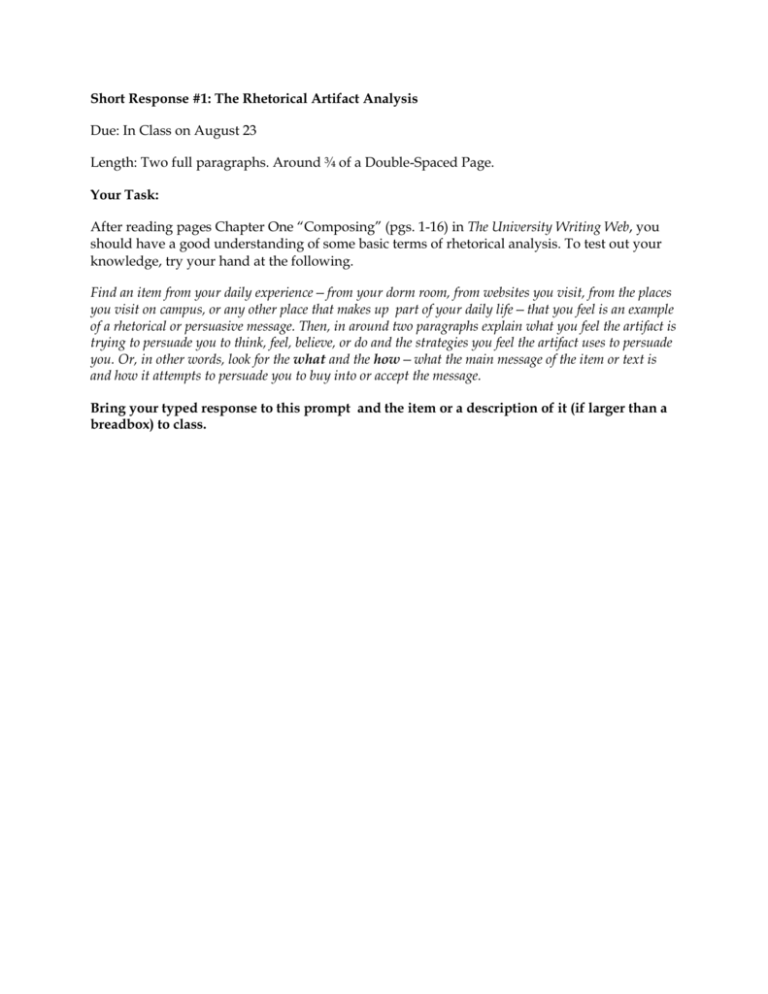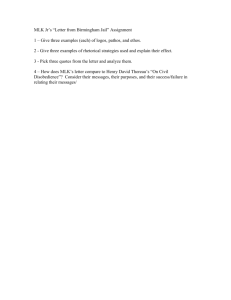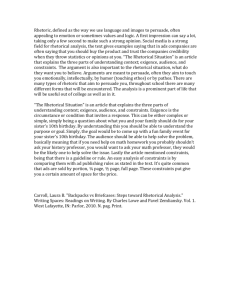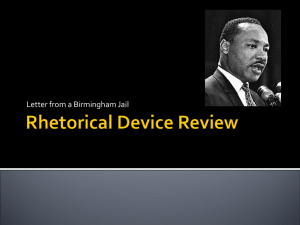Short Response #1: The Rhetorical Artifact Analysis Due: In Class
advertisement

Short Response #1: The Rhetorical Artifact Analysis Due: In Class on August 23 Length: Two full paragraphs. Around ¾ of a Double-Spaced Page. Your Task: After reading pages Chapter One “Composing” (pgs. 1-16) in The University Writing Web, you should have a good understanding of some basic terms of rhetorical analysis. To test out your knowledge, try your hand at the following. Find an item from your daily experience—from your dorm room, from websites you visit, from the places you visit on campus, or any other place that makes up part of your daily life—that you feel is an example of a rhetorical or persuasive message. Then, in around two paragraphs explain what you feel the artifact is trying to persuade you to think, feel, believe, or do and the strategies you feel the artifact uses to persuade you. Or, in other words, look for the what and the how—what the main message of the item or text is and how it attempts to persuade you to buy into or accept the message. Bring your typed response to this prompt and the item or a description of it (if larger than a breadbox) to class. Short Response #2: “I Have a Dream” Length: 1 Double-Spaced Page Your Task: Print a copy of King’s speech and read it with a pencil or pen in hand. As you read it, annotate the text by doing the following: Underline Passages You Think Are Highly Important. Write in Ethos, Pathos, Logos in the margin anytime you see an interesting example of them. Try to identify at least 2 examples. When you have done this, I want you to look back through the speech and write a one-page analysis based on the following prompt. After reading King’s speech, you are going to be tempted to say that the speech is about “equality” or “unity.” This is the sound-bite version of King’s speech, and it does not do justice to what is actually being said. We have to push ourselves to understand the rhetorical situation of this text more deeply. Without falling back on the easy argument that the speech is about “equality” or “unity,” write a one page response that explains what you feel the speech is actually trying to persuade the audience to do or think and examine what you feel is the most important rhetorical strategy that the speech uses to persuade them. Short Response #3: King’s “Letter from Birmingham Jail” Length: one double-spaced page minimum but more is just fine. Due: Tuesday 9/4 Your Task: Now that we have spent some time with King’s “I Have a Dream” speech, I want to challenge you to read “Letter from Birmingham Jail” in the context of the eight Alabama Clergymen, who wrote “A Call to Unity.” Write a one page (minimum) analysis that analyzes King’s most effective counterargument to the argument to “A Call to Unity.” Here are some steps: 1. Read “A Call to Unity” and “Letter from Birmingham Jail” closely, noting their most important arguments and rhetorical strategies. 2. Looking back and King’s “Letter from Birmingham Jail” choose a rhetorical strategy (ethos, pathos, logos, or kairos) and examples from the letter that you feel offer the most persuasive alternative to the arguments of “A Call to Unity.” 3. Then, drawing on a short quotation or examples from the speech, one or two of the passages or examples that you chose, explain why you think they are strong examples of how King counters the argument of the clergymen. Please type this assignment and turn it in during class on 9/4. Let me know if I can be of any help.







